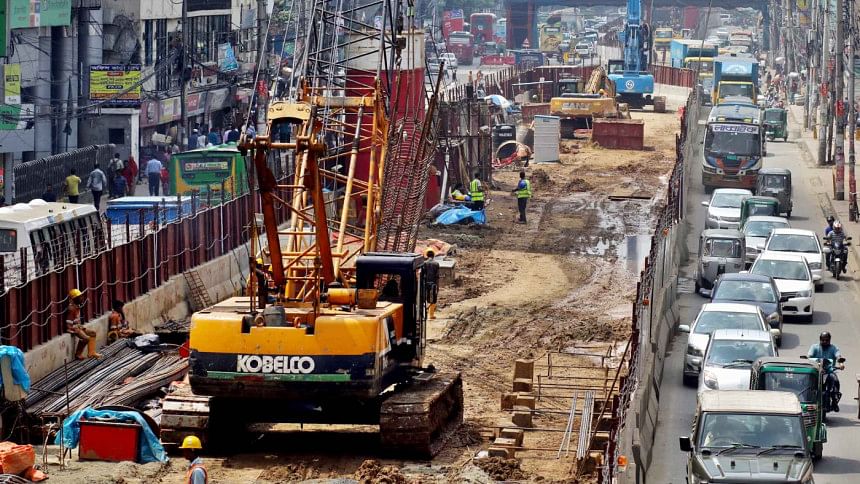Be careful with ‘over-optimism’ for megaprojects

Geostrategic factors such as its location between South Asia and Southeast Asia, sustained economic growth, relative political stability, availability of cheap labour, and a large consumer market have made Bangladesh an attractive investment centre for many regional and international players. Capitalising on this, the Bangladesh government has been eyeing a number of megaprojects to shift its economy into the next gear. Three of these projects are being funded by China. Japan is providing funding for the Dhaka Mass Rapid Transit (metro rail) and Matarbari deep seaport projects and contributing to the Jamuna Railway Bridge and Hazrat Shahjalal International Airport Terminal 3 projects, while Russia and India are financing a project each.
In April, the prime minister said 2022 and 2023 would be very important years for Bangladesh in terms of infrastructure development. The Padma Bridge, which is expected to contribute 1.2 percent to the GDP, she said, is set to be inaugurated in less than a month. The Dhaka metro rail will be opened on the 14km Uttara-Agargaon route by the end of the year, bringing "revolutionary change" to Dhaka's transport system. The Karnaphuli River Tunnel in Chattogram, the country's first underwater tunnel, is expected to be opened this October. And the first unit of Rooppur Nuclear Power Plant (1,200MW), the largest development project in the country's history, is expected to be commissioned by the end of 2023.
While all this is good news, the recent financial debacle in Sri Lanka should provide us with some food for thought.
Experts have provided a range of reasons such as cronyism, dictatorial power, family politics, lack of economic diversification, and excessive foreign borrowing for what is happening in Sri Lanka. But another factor that has recently been discussed is the issue of endemic over-optimism. Due to the terrific post-war performance of the Sri Lankan economy, "policy complacency and irrational exuberance led to investments in popular big-ticket projects," which ignored the underlying macroeconomic vulnerabilities. Clear warning signs such as "falling exports, mounting debts and rising inequality were ignored much like a 'grey rhino' running at you at a high speed," according to Dr Niaz Asadullah, professor of economics at Malaya University and Monash University Malaysia, and also policy adviser on food and agriculture to the Malaysian government.
Does Bangladesh face similar risks? Perhaps not, if it can overcome the various challenges to its ambition, such as maintaining economic diplomacy between the major infrastructure financiers, avoiding debt traps, ensuring project transparency and construction timelines, and spreading economic development evenly across the country.
One important but oft-ignored thing is that design and implementation mistakes delay the revenue-generation phase of megaprojects. For example, the 55km Dhaka-Mawa-Bhanga Expressway is the most expensive highway in the country and the world, where more than Tk 200 crore has been spent per kilometre. But with the toll plaza not yet ready, the expressway is still not able to generate the expected revenue. Perhaps because of this lost revenue, even before implementing the toll rates previously fixed for the expressway, the government is already planning to increase the toll rates—a move that will push up transport costs.
If we look at the RNPP project, it was originally supposed to start generating 1,200MW of electricity in 2021 and 2,400MW by 2022. However, even though the first reactor has been installed, no electricity transmission line has been designed or built yet, and so, even if the reactor is ready, it will not be able to move into production, and the government will have to pay capacity charges against the idle plant. The same thing happened with the Rampal power plant.
These are some examples of how public expenditure is not paying off the promised economic utilities. Because development projects in Bangladesh have a tendency to go through multiple phases of revision, resulting in cost escalation and delays, when juxtaposed against the initial projection of expected outcomes, the majority of them fail to achieve their targets. In the end, the burden falls on the end consumers, who are deprived of the timely delivery of services, while the cost of the services to be delivered by the project rises.
Repayment of the loans we have taken for these projects also become more problematic. According to eminent economist Debapriya Bhattacharya, Bangladesh's debt situation may become somewhat tricky in 2024-2025 if the government fails to increase its revenue base now, as the repayment schedule for many of the costly loans would begin then. Bangladesh's foreign loan composition has already started to change, with concessional loans from multilateral lenders being replaced with costlier bilateral loans—with higher interest rates and shorter grace periods—because of the country's graduation from the low-income bracket. Therefore, it is essential for the government not to be wasteful with these foreign loans, and to find some way to increase the tax-GDP ratio, which has proven to be a Herculean task so far.
Another factor that should not be overlooked is that because the fast-track megaprojects grab a large chunk of the budgetary allocation set aside for the Annual Development Programme (ADP)—for example, in FY2021-22, 10 such projects grabbed nearly one-third of the Tk 225,324 crore ADP—the Planning Commission cannot provide adequate funds for many other small, medium and big projects, per their own admission. The opportunity cost that arises from this is by no means insignificant, and it adds up over time.
The bottom line is that Bangladesh is not guaranteed to benefit greatly from the megaprojects that are currently in the pipeline. In fact, if we continue along our current trajectory, they even have the potential to do more harm than good. That's why the government should avoid falling into the trap of being overly-optimistic about them. Instead, it should work towards developing the capacity to implement all these projects on time and within their original budgetary requirements.
Eresh Omar Jamal is assistant editor at The Daily Star. His Twitter handle is: @EreshOmarJamal

 For all latest news, follow The Daily Star's Google News channel.
For all latest news, follow The Daily Star's Google News channel. 






Comments